In the last week I have been hunting for the Perseid Meteor shower that appears at this time of year. The largest number of meteoroids will occur on the night of the 12th - 13th of August when you could see over a dozen shooting stars an hour. They are only called meteors when they enter the earths atmosphere and can be pretty incredible to see.
To find the region of sky in the northern hemisphere look east after midnight and find the stars of Cassiopeia. It looks like a big W of 5 stars. The region below Cassiopeia is the place to point your camera or just sit and watch.
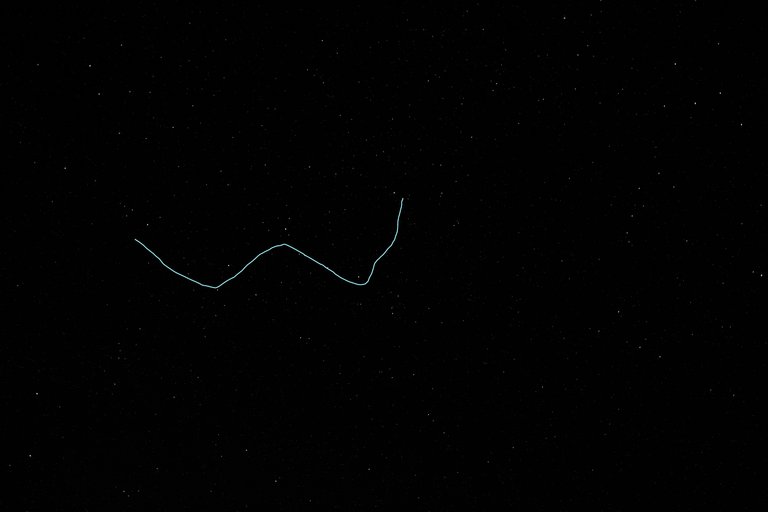
It is always a spectacular show if you have a dark sky, no cloud and a bit of luck. To increase my chance of photographing some of these space travelers. I have been keeping and eye out for no clouds. Which has only been one night this week; which was last night here in England.
The next four images are of the same meteoroid taken in rapid succession.
Perseid Meteor first sighting
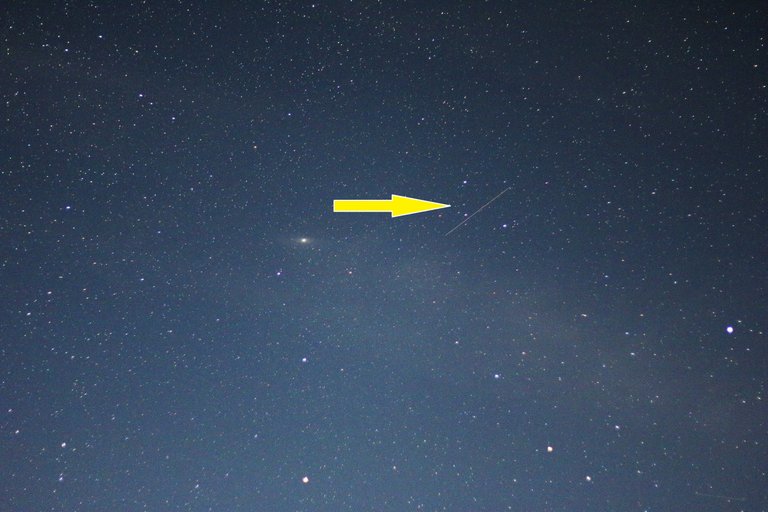
Perseid Meteor cropped in tight
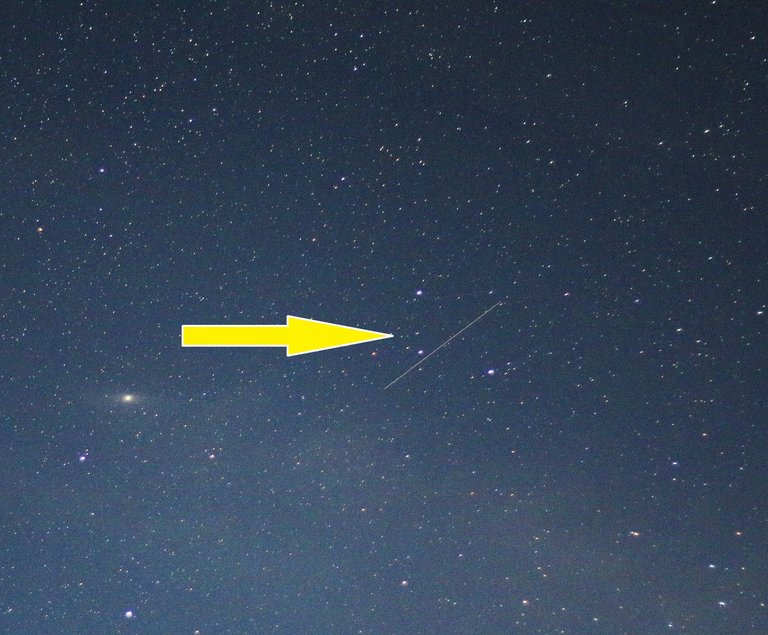
Perseid Meteor second capture as it flies through space
These next two images were taken just a few seconds apart.
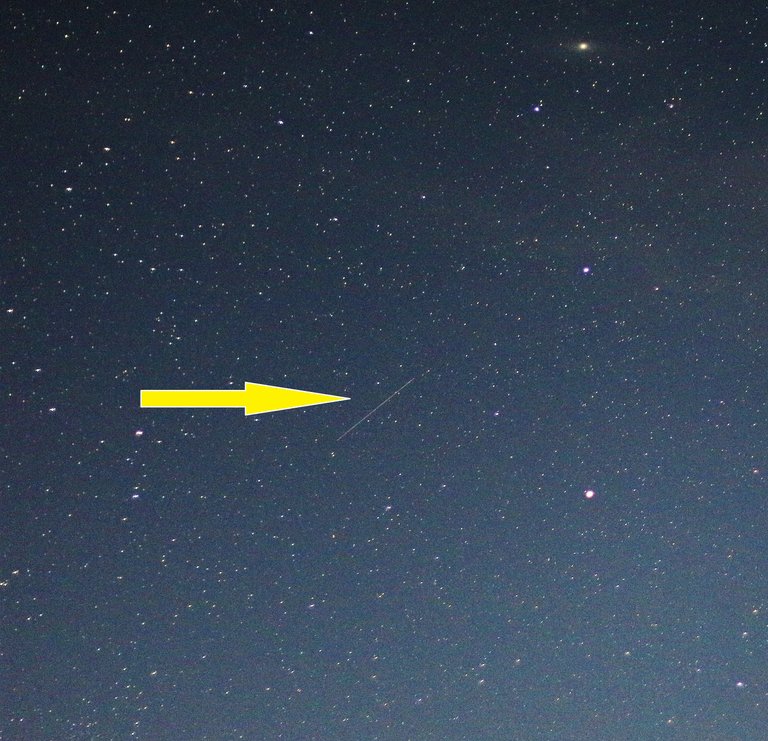
You can see how far it has traveled in such a short time. "They are moving at roughly 133,200 mph (60 kilometers per second) relative to the planet"
Source
The camera was on a tripod but on a wooden deck which may account for the slight movement which was magnified in this image.
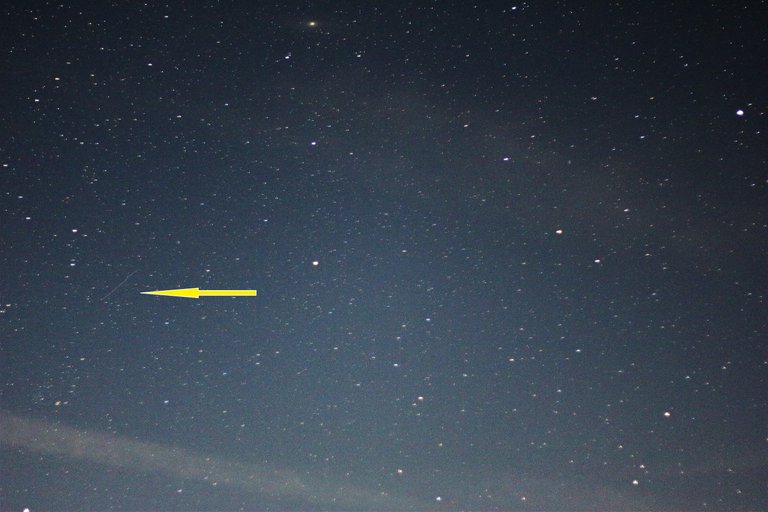
These two were very faint. They were taken about 60 degrees to the right of the other images.
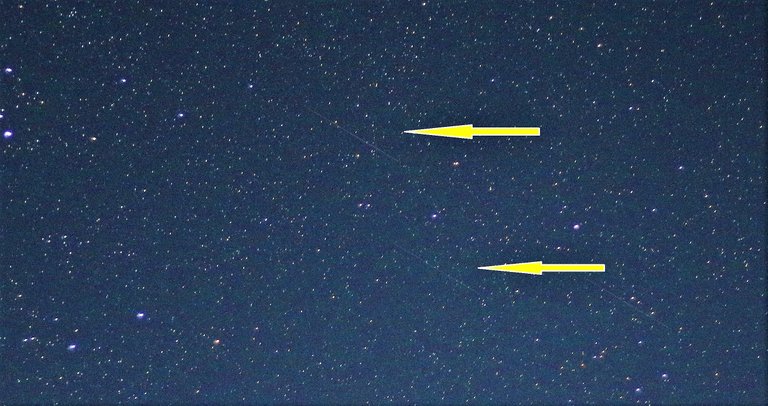
I have used a very basic photo editor to enhance these images a little which were shot in jpg format. Not the optimum for my camera.
I'm still learning the best settings for #astrophotography using the Canon 70D. It is constantly surprising me with what it can do. I'm just happy as a kid in a candy shop to have got anything at all. Hope you like them.
These images were taken at approximately 12:30 a.m. to 12:45 a.m. 23rd July 2018
More in this series
I think I found a whole Galaxy
Star trails and constellations
Many thanks to @astrophoto.kevin for his invaluable advice on my camera settings. They worked great.
My camera gear
EOS Canon 70D
Canon 50 mm 1.8 II lens
Sigma 30 mm lens
Sigma 20 mm lens
Pixel Shutter Cable Release
Travel tripod
| Category | (astrophotography) |
| Camera | (Canon EOS 70D) |
| Exposure | (6 seconds) |
| f Stop | (1.8) |
| ISO | (1600) |
| Lens | (Canon 50 mm lens) |
Great shots @molometer
You have catched some really nice ones :-)
It's nice to hear, that the settings worked well for you.
Hopefully, we get some clear nights this weekend, especially for the lunar eclipse and for the Perseids, which should be more and more each day.
Thanks @astrophoto.kevin I'm pleased that I got anything at all as they were not visible to the naked eye. I first knew I had something when looking at the playback.
The settings you suggested were great. :)
They can be very faint and when you get blinded by the bright camera display seeing them is much more difficult.
It's tricky for sure. I could see that the camera had got something but was only in the edit that I saw them clearly.
Are you filming the eclipse? I'm going to give it a try on Friday.
I also will give it a try on Friday. But I do not know whether to film it or to record it normally. It depends how fast the shadow of the earth will move. Maybe I will make also both ;-)
I have tried it years ago with a little compact camera and had no luck.
I wish you good luck and clear sky for Friday :-)
I'm going to try both film and photos. I have a camcorder that I've filmed the moon with before so I know that will work.
I will see what I can do with the the Canon too.
Either way we are dependent on a clear sky! Fingers and everything else crossed.
I keep everything crossed ;-)
But it looks good the weather forecast says it will be a clear night. Hopefully, he is right.
I can only make short video sequences and make some images of it. I hope that I will get at least 1 or 2 good images.
Se I told you you'd be as happy as a kid in a candy? sweet shop @molometer.
Are you going to photograph the upcoming eclipse? Will we be able to see it in the UK do you know?
We should be able to see the full eclipse on Friday 27th July in the UK.
From about 8 p.m. if we have no cloud 😜 should last about 4 hours in total.
I'll be filming it with bit of luck.😜
Fingers crossed there will be no cloud then @molometer. Depending upon which weather forecast you look at we've got thunder storms forecast! 😢
We had a small shower of rain and a little thunder today the rain instantly evaporated? Hope we have clear skies tomorrow night.
We've just driven down to Devon and there was a heavy downpour about an hour ago but that's it. It's still really humid and there's a lot of heavy cloud right now. 😢
Yep we've got a lot of cloud here too. Have fun in Devon ;)
What a crying shame @molometer. After all that sun and it decided to cloud over today of all days. 😢
We went down to Hartland Quay which is a great spot for sunsets but it was just clouds. The light was pretty though. 😊
It’s wonderful that you can get out somewhere you can photograph such astrological phenomena.
Y’know, since I’ve been grown, I’ve never lived anywhere I could see the meteor showers. There’s always too much light pollution. When I was a kid, no adults in my life were interested in such things. Now, I’m just too disabled to go tramping about rural fields in the dark. :(
These photos were taken in my back garden. 😜
I know what it's like to live with light pollution. I grew up in London.
Living as I do now, in the countryside has it's benefits.
I've been interested in looking at the stars since I was a kid.
It's nice to be able to actually do some stargazing with the gear I've got.
I made a few videos of the Moon and an eclipse years ago with my old camcorder. 😜
They are on YouTube and on here too.
The EOS 70D is an awesome camera, these photos are great.
Thanks it is pretty amazing what the EOS 70D can do. I'm learning so much every day with this camera.
The meteoroids are magical. :)